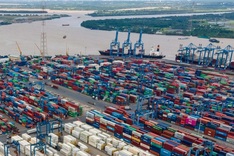
Lina Nguyen, a business development director at Exness Investment Bank, held that the dormant phase of cryptocurrencies has ended. Positive signals are increasingly evident, with more institutional investors entering the market.
She predicted that investment in digital assets is forecast to continue rising. Financial institutions are showing interest in this segment, although retail investors remain cautious.
In the first few months of this year alone, over 1.2 trillion USD has been invested in digital asset exchange-traded funds (ETFs).
According to the US blockchain analysis firm Chainalysis, the positive trend in the cryptocurrency market observed in 2023 is expected to extend to 2024, bolstered by the US approval of spot Bitcoin ETFs and the growing participation of institutional investors.
Vietnam ranks third globally in the number of cryptocurrency holders. Data from Crypto Crunch App indicates that 26 million people in the country own cryptocurrencies, five times the local number of stock trading accounts.
Research by Dr. Nguyen Nhat Minh and Dr. Thai Trung Hieu from RMIT University shows that cryptocurrency owners in Vietnam are demographically diverse, including young, highly skilled workers, tech enthusiasts, and small business owners seeking alternative investments.
Chainalysis reports that up to 120 billion USD in cryptocurrencies entered Vietnam within a year to June 2023. Vietnamese investors netted 1.18 billion USD in profits last year, placing the nation among the top five Asian markets with the highest returns from cryptocurrency investments, alongside China, Indonesia, India, and the Republic of Korea.
Dr. Pham Anh Khoi, Vice Chairman of the Fintech Application Committee at the Vietnam Blockchain Association, cited a report by Boston Consulting Group estimating that the global market for tokenised real-world assets (RWA) could reach 16 trillion USD, or 10% of global GDP, by 2030. Standard Chartered predicts this market could double to 30 trillion USD in the following four years.
Offering low-cost, efficient funding channels for projects with tangible assets, digital assets, particularly RWAs, present a valuable opportunity for developing countries like Vietnam to engage in the global capital market. The influx of cryptocurrency over the past year was nearly five times greater than foreign direct investment (FDI) inflows in the country.
While digital assets are an attractive investment and fundraising channel, providing portfolio diversification for investors and funds, they are also high-risk, with significant volatility. The market has a high incidence of fraudulent projects, making it unsuitable for uninformed investors.
Experts stressed the urgent need for a legal framework to harness the potential of the digital asset market. If appropriate management policies are enacted, these funds could be a positive force for economic growth rather than being lost to the shadow economy, Khoi assessed.
As interest in owning and investing in digital assets grows, consumer protection regulations and market transparency are increasingly necessary. This includes measures to prevent fraud and combat cyber threats. Implementing strict regulations to protect consumers could help build investor confidence and encourage broader participation in the crypto asset market.
Moreover, an unregulated cryptocurrency market could pose financial stability risks in Vietnam. Without proper oversight, crimes such as money laundering and terrorism financing could emerge.




















